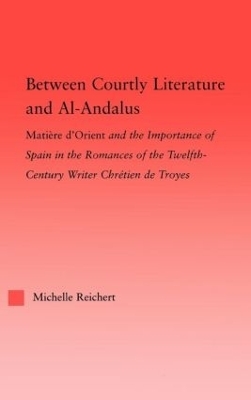
Between Courtly Literature and Al-Andaluz
Oriental Symbolism and Influences in the Romances of Chretien de Troyes
Seiten
2005
Routledge (Verlag)
978-0-415-97615-2 (ISBN)
Routledge (Verlag)
978-0-415-97615-2 (ISBN)
Chretien de Troyes uses repeated references to Spain throughout his romances. Demonstrating that these allusions to Spain occur at pivotal moments in the romances and are often coupled with linguistic 'riddles', this book states that these references seem to support the idea that some of their themes in his romances are of "Andalusi" origin.
Chrétien de Troyes uses repeated references to Spain throughout his romances; despite past suggestions that they contain Mozarabic and Islamic themes and motifs, these references have never been commented upon. The book will demonstrate that these allusions to Spain occur at key moments in the romances, and are often coupled with linguistic riddles which serve as roadmaps to the manner in which the romances are to be read. These references and riddles seem to support the idea that some of their themes and motifs in Chrétien's romances are of Andalusi origin. The book also analyzes Chrétien's notion of conjointure and shows it to be the intentional elaboration of a sort of Mischliteratur , which integrates Islamic and Jewish themes and motifs, as well as mystical alchemical symbolism, into the standard religious and literary canons of his time. The contrast afforded by Chrétien's use of irony, and his subtle integration of this matière d'Orient into the standard canon, constitutes a carefully veiled criticism of the social and moral conduct, as well as spiritual beliefs, of twelfth-century Christian society, the crusading mentality, chivalric mores, and even the notion of courtly love . The primary interest of the book lies in the fact that it will be the first to comment upon and analyze Chrétien's references to Spain and the rich matière d'Orient in his romances, while suggesting channels for its transmission, through scholars, merchants, and religious houses, from northern Spain to Champagne.
Chrétien de Troyes uses repeated references to Spain throughout his romances; despite past suggestions that they contain Mozarabic and Islamic themes and motifs, these references have never been commented upon. The book will demonstrate that these allusions to Spain occur at key moments in the romances, and are often coupled with linguistic riddles which serve as roadmaps to the manner in which the romances are to be read. These references and riddles seem to support the idea that some of their themes and motifs in Chrétien's romances are of Andalusi origin. The book also analyzes Chrétien's notion of conjointure and shows it to be the intentional elaboration of a sort of Mischliteratur , which integrates Islamic and Jewish themes and motifs, as well as mystical alchemical symbolism, into the standard religious and literary canons of his time. The contrast afforded by Chrétien's use of irony, and his subtle integration of this matière d'Orient into the standard canon, constitutes a carefully veiled criticism of the social and moral conduct, as well as spiritual beliefs, of twelfth-century Christian society, the crusading mentality, chivalric mores, and even the notion of courtly love . The primary interest of the book lies in the fact that it will be the first to comment upon and analyze Chrétien's references to Spain and the rich matière d'Orient in his romances, while suggesting channels for its transmission, through scholars, merchants, and religious houses, from northern Spain to Champagne.
Michelle Reichert
Chapter One Erec et Enide : Enide as Magistra Femina in Erec's Chivalric Quest for Spiritual Perfection Chapter Two Cligès , the Phoenix, and the Four Horses of the Apocalypse: Chrétien de Troyes's Oriental Reading of the Medieval Epic and Romance Genres Chapter Three Chrétien de Troyes's Chevalier de la Charrette : A Twelfth-Century History of Patronage? Chapter Four Chrétien de Troyes's Chevalier au Lion An Alchemical Treatise? Chapter Five Maternal Filiation and the Conte du Graal : The Sin of a Lineage Forgotten
| Erscheint lt. Verlag | 27.3.2006 |
|---|---|
| Reihe/Serie | Studies in Medieval History and Culture |
| Verlagsort | London |
| Sprache | englisch |
| Maße | 152 x 229 mm |
| Gewicht | 566 g |
| Themenwelt | Geisteswissenschaften ► Sprach- / Literaturwissenschaft ► Anglistik / Amerikanistik |
| Geisteswissenschaften ► Sprach- / Literaturwissenschaft ► Literaturwissenschaft | |
| Recht / Steuern ► EU / Internationales Recht | |
| Recht / Steuern ► Wirtschaftsrecht ► Urheberrecht | |
| ISBN-10 | 0-415-97615-4 / 0415976154 |
| ISBN-13 | 978-0-415-97615-2 / 9780415976152 |
| Zustand | Neuware |
| Haben Sie eine Frage zum Produkt? |
Mehr entdecken
aus dem Bereich
aus dem Bereich
Poetik eines sozialen Urteils
Buch | Hardcover (2023)
De Gruyter (Verlag)
59,95 €
Buch | Softcover (2024)
belleville (Verlag)
20,00 €


